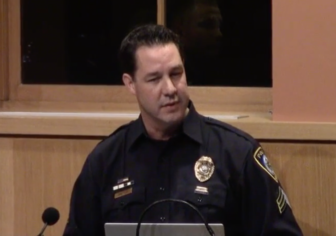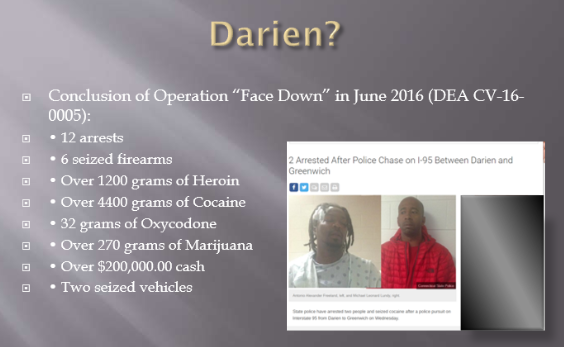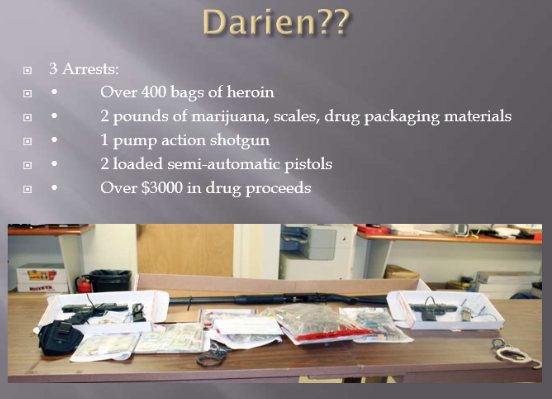While Darien police actively make arrests of people caught with illegal drugs, that can’t stop people from becoming addicted in town, and a good portion of the burglaries and other crimes committed in Darien stem from it.

Image from the Darien TV79 video of the meeting
Darien Police Sgt. Jeremiah Marron Jr., speaking at the second of three “Darien: How Healthy Are We?” presentations at Darien Library.
Those were two of the points made by Darien Police Sgt. Jeremiah P. Marron Jr. at a one of a series of recent public meetings, “Darien: How Healthy Are We,” at Darien Library.
Marron, a detective and member of the Selective Enforcement Unit, was one of three members of the Police Department who described what police know generally about illegal drug abuse in town and what they do about it. You can watch a video of the entire meeting at the bottom of this article.
Enforcing laws is a necessary part of dealing with the problem, Marron said, but he added:
We’d be fools to think that we can arrest our way out of this problem. It is part of the battle. […] But we’ve had to change our approach. Through programs like this, I think we can make people more aware of what the underlying problem is.
With the heroin and opioid epidemic, the problem has grown, Marron said, particularly with the abuse of heroin and prescription opioids, so the department has concentrated more resources on it.
What follows is the text of nearly all of Marron’s presentation at the Jan. 19 meeting, but we’ve rearranged a couple of paragraphs and removed some descriptions of events that we reported on in an earlier presentation Marron and other police officers gave in November 2015:
Understanding the Problem
Prescription Medications: One of the Sources of the Opioid Epidemic
This demonstrates that the problem does not discriminate and in fact it may even prey on affluent communities more. Experts now agree that one out of every four heroin addicts were already addicted to prescription pain medications, such as oxycontin and other opioid-based prescription narcotics.
I haven’t met a heroin addict yet that actually chose to be a heroin addict […] But unfortunately it seems to be the most likely outcome once somebody’s already addicted to prescription medications. […]
Addicts Hide Their Addiction from Families; Families Hide It from Others
I personally believe that part of the problem is the culture that’s associated with addiction. There’s a lot of shame attached to it, and being a heroin user or being addicted to prescription pain medications is not something you’re going to go around bragging about.
It’s often hidden by the user, hidden by the user’s loved ones.
We’ve made arrests of young adults, and when we go to notify their parents, that’s the very first time they ever knew there was a problem.
And we’ve also knocked on people’s doors to explain to them that their son or daughter is pawning all their jewelry and silverware.
They stand there in disbelief until we tell them, ‘Well, go upstairs and see if you can find your Class of ’81 Stamford High School ring,’ and it’s not where it’s supposed to be, and they realize that’s the first red flag. They had no idea until we actually knocked on their door.
Police Knowledge About the Growing Number of Overdoses in Town Is Limited
Another startling statistic — toward the middle of 2014 we were notified by medical authorities that in 2013, there were 13 Darien residents that were treated for heroin overdoses at a local hospital.
None of them were fatal, thankfully, but the problem is the Police Department didn’t know about one of them. None of them were reported to the Police Department. Hospitals are required to report dog bites to us, but they’re not required to report things of this nature, so it’s startling.
This past year […] our records show that there were nine reported overdoses, and two of them were fatal. Unfortunately we also know that there were some that were not reported, that we have no idea how to keep track of.
The state’s chief medical examiner projects that nearly 900 deaths in Connecticut from 2016 will be ruled as fatal drug overdoses — namely, heroin — once the investigations are actually complete.
Drug Addiction Causes Much of the Crime in Darien
You may not think it [substance abuse addictions] is your problem, you may not think it’s a problem for your community. You may think it’s the problem of the family down the street whose kids were heading in that direction anyway, but it is your problem.
Just because it’s not your family member or loved one suffering from addiction doesn’t mean it’s not affecting you.
Darien had — I think it’s probably an all-time high — 102 car burglaries in 2016; 34 burglaries of homes or businesses; and 15 stolen cars. A lot of arrests were made in a majority of these incidents, and it’s clear that a majority are being perpetrated by drug abusers.
_________
Like this article? …
- Sign up for the Darienite.com weekday newsletter.
- Like Darienite.com on Facebook.
- Follow Darienite.com on Twitter.
_________
And I bet you, if you asked any of the victims of any of these incidents, they’re going to whole-heartedly agree that there’s a drug problem in this community. […]
Every single day in Darien we respond to incidents that are somehow connected to this narcotic problem: As I mentioned, home and vehicle burglaries, larcenies from retail stores, DWIs, domestic violence and, obviously, overdoses, smash-and-grabs at cash registers and stand-alone ATMs, a high-speed chase just the other night.
I interviewed a burglary suspect at Bridgeport Correctional Center this past Tuesday, and it’s all connected to narcotics cases.
Enforcing the Law
The Selective Enforcement Unit
In 2013 our department formed a part-time narcotics unit. You wouldn’t think that in a town like Darien, 50 officers wouldn’t need a narcotics unit, but due to the problems [we’ve had] it’s become a necessity.
That unit is titled the “Selective Enforcement Unit.” It’s comprised of a K9 team, SWAT officers, investigators, the youth detectives and crisis negotiators. We’re tasked with handling a variety of enforcement areas, but almost four years later, and having just added our 14th member, you can realistically change our name to the “Prescription Narcotics and Heroin Abuse Unit.”
As of today, and I had to run the numbers, out of 22 current narcotics cases that our unit is working on, 15 of them are for the sale and use of heroin or opiate-based prescription medications in Darien. […]
Drug Arrests and Investigations
So what are we doing? Well, it’s obvious, we’re making arrests — numerous arrests. In fact, just this past year alone, arrests were obviously made in Darien, Stamford, Norwalk and Bridgeport, and — believe it or not — Miami, New York and New Jersey. All these arrests were stemming either from information that either came from here in Darien or incidents that occurred here in Darien.
Operation Face Down
So probably the largest case that we worked on this [past] year was again information that we developed. It was a federal investigation that was called Operation Face Down.
It was titled “Face Down” because that was [what was on] the stamp on the packages of heroin in a certain batch that was going around [and] that was responsible for dozens of fatalities in Fairfield County towns.
So we joined the Stamford and Norwalk police, the DEA [U.S. Drug Enforcement Administration], and the FBI. We conducted a six-month-long investigation involving undercover officers and we traveled through a variety of East Coast states, and as you can see [in the slide] some of our results — they’re pretty lucrative. Hopefully we made somewhat of an impact.

Part of the Darien Police presentation
Other Investigations
A little later in the year 2016, again, right here in our back yard, we developed information that was connecting young adults from Darien to heroin dealers in Bridgeport, so we immediately teamed up with the Bridgeport Tactical Narcotics Team and we conducted an undercover investigation for several weeks […] leading to a few different arrests, and hopefully we made an impact.

Part of the Darien Police presentation
Along with Law Enforcement, Addicts Need Treatment
We’d be fools to think that we can arrest our way out of this problem. It is part of the battle. […] But we’ve had to change our approach. Through programs like this, I think we can make people more aware of what the underlying problem is.
It’s not just what you see in the newspapers, that someone was arrested. […]
God forbid, but consider if your son or daughter had a brain tumor. You would search for the proper treatment, and at [any] expense. If your child is a drug addict, the top [of the] list of priorities is hiding it from your neighbors. So it’s almost backwards.
I believe the culture in this state really has to change concerning addictions.
____________________
Medical experts and drug addiction counselors also spoke in the series of meetings and said that when users become addicts, their problem needs to be addressed with medicine and counseling.
You can watch their presentations in the TV79 videos of the three meetings (the one in which Marron spoke is below, the others are here and here), and Darienite.com will publish articles like this one on their talks.
(In this video, Marron spoke from about the 18:00 mark to about the 28:00 mark. The entire police presentation, with comments from Police Chief Duane Lovello and Detective James Palmieri, went from about the 9:00 mark to about the 41:00 mark.)
How Healthy Are We Part 2 1-19-17 from Darien TV79 on Vimeo.

Pingback: DEA Thanks Two on Darien Police Force for Work in Major Area Investigation — Was It 'Operation Face Down'? - DarieniteDarienite
Pingback: Panelists: High Rate of Teen Drinking in Darien Comes with High Stress, Lax Attitudes - DarieniteDarienite
Pingback: Overcoming Opioids: Big Increase in Prescription Drugs Collected at Drop Boxes in CT - DarieniteDarienite
Pingback: What Happens When Darien Police Visit an Under-Age Party with Alcohol - DarieniteDarienite
Pingback: DHS Principal Ellen Dunn on Drugs, Drinking, Disciplining Students and What Parents Can Do - DarieniteDarienite
Pingback: After 20 Vehicles Entered, Several Thefts, 2 Cars Stolen in Two Weeks, Police Arrest 2 Teens - DarieniteDarienite